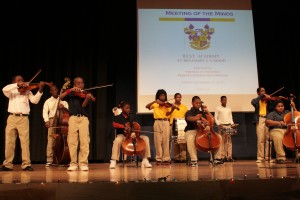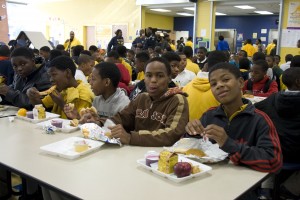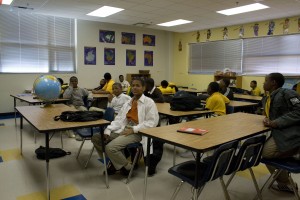From the moment they greet us with broad smiles and outstretched hands it is clear that Jabari Booker and Mykael Riley – our tour guides for the morning – take their duties very seriously. The seventh graders enthusiastically embrace principal LaPaul Shelton’s request to show us around their school.

Seventh graders Jabari Booker and Mykael Riley.
One thing is immediately apparent: Neither of these 12-year-olds, with their closely-cropped hair and spectacles perched on their noses fit the stereotypical images of young black males that often pervade in mainstream media and popular culture. Both are thriving academically, have never had any run-ins with the law and have great relationships with their fathers. Many of their classmates at B.E.S.T. Academy, a single-gender Atlanta Public School with a student body comprised entirely of black boys, aren’t so fortunate.
“Some students have emotional issues based on their past and the fact that they don’t know their father,” says Mykael. “In some cases they never knew him or their father may have died or was killed. Here there are a lot of male teachers who can relate to them like a father; they’re basically like a father who cares for his children and wants them to be great.”
Jabari agrees.

The plethora of African-American male teachers on the faculty help serve as positive male role models for students.
“A lot of the kids here don’t have access to positive male role models, but the teachers here care about us and want to help show us how to be men,” he says. “Some of the kids around here act up, but the teachers really care. A teacher isn’t just going to say that you failed a test; they want to help you succeed. This is a place where you can ask for help.”
The demographics of the northwest Atlanta community off Donald Lee Hollowell Parkway (formerly known as Bankhead Highway) where the school is located, provide a snapshot of what administrators are up against daily. More than 90 percent of students receive free or reduced lunch. According to research by the American Physical Society, of nearly 29,000 residents in the nearby area:
- 41 percent have less than a high school education
- 10 percent are unemployed
- 51 percent are not part of the labor force
- 51 percent of children are being raised by grandparents.
The data is daunting, but administrators say they’re up for the challenge.

LaPaul Shelton is in his second school year as principal.
“We try to create an environment where it’s not all about pointing a finger at them, because a lot of the problems these young men face have to do with the neighborhood and environment that they are living in,” says Shelton of the economically challenged community often referenced in rap songs. “They live in a place where it’s okay to wear your pants sagging and to handle things in a violent way. We’re trying to change those behaviors; we’re trying to change a mindset.”
Although administrators agree that the past few years have had its shares of challenges, there is concrete evidence that Shelton’s approach is working. In the 2009-2010 school year, the school met its Annual Yearly Progress projections and for the first time it was removed from the school system’s “needs improvement list.”
“We’re working to build upon that success; it’s a daily practice,” says Shelton, now in his second term as principal.
Teacher Alva Hartry says changing negative behaviors is mostly achieved through providing students with critical support and positive reinforcement.

Classroom instruction is supplemented by an array of extracurricular activities including chorus, band, orchestra, art, computer technology, football, basketball, debate, robotics and baseball.
“This is probably one of the few places where our young African-American males are being recognized for their achievements,” she says. “We always tell the students, ‘you need to be supportive of each other.’”
Mykael and Jabari’s pride in their school is apparent as they stroll the halls. They grin and giggle as they share the specs of the sprawling $30 million facility and rattle off details about the different personalities of the teachers. Not so surprisingly, school lunch gets a thumbs down as merely “edible” and although they embrace the all-male environment they agree that having female classmates would be a lot more fun. They both concur that B.E.S.T. is, well, the best place for them to learn and prepare for prosperous futures.
Inspirational quotes such as “part of success is preparation on purpose” and “if there is no struggle there is no progress” line the walls, serving as subliminal reminders of the school’s mission “to prepare our students to enter into a four-year institution of higher learning as they transform into the B.E.S.T. Men.” Pennants posted around bearing the names of universities like Brown, Princeton, Georgia-Tech and Clark Atlanta University highlight the college preparatory curriculum.
B.E.S.T. Academy at Benjamin S. Carson, named in honor of the renowned African-American neurosurgeon, opened in a temporary building in August of 2007. It moved to the new facility in the summer of 2009. B.E.S.T. is an acronym for Business, Engineering, Science, and Technology, which is the focus of the curriculum. The school began with sixth grade and a grade has been added every year since. Ninth is currently the highest grade, but the ultimate goal is to expand to 12th by 2013.
B.E.S.T. was initiated by Atlanta Public Schools based on the research of New York Times bestselling author, business consultant and social philosopher Michael Gurian, who asserts that girls and boys have different learning styles. To this effect, teachers at B.E.S.T. employ teaching strategies that are geared toward the general learning styles of boys. The students are immersed in a rigorous academic curriculum, which includes language arts, social studies, reading, math and science. Classroom instruction is supplemented by an array of extracurricular activities including chorus, band, orchestra, art, computer technology, foreign languages, football, basketball, track and field, debate, robotics and baseball.

B.E.S.T. is located in northwest Atlanta off Donald Lee Hollowell Parkway, formerly known as Bankhead Highway.
Being single gender is not exclusively what makes B.E.S.T. Academy unique. The prevalence of male teachers makes it a standout too – clearly a direct response to the critical need for male role models for a student body that overwhelmingly hails from single-parent households.
“The female teachers will sometimes baby some of the students, but the male teachers are hard on us sometimes,” says Jabari. “They know that we need more male role models and they’re tough in order to let us know that acting up is not right.”
The school operates in partnership with the 100 Black Men of Atlanta, Morehouse College, the Atlanta Falcons and other community organizations featuring prominent and professionally successful African-American men. Emory University, along with non-profits such as the Be Proactive Foundation, Pro Active Management, Greening Youth Foundation and Visions Unlimited, are also among the academy’s community partners.
Teachers are charged with closing the massive achievement gap that exists nationwide and in metro Atlanta among young black males. Many teachers stay late weekdays working one-on-one with students, there are regular Wednesday tutorial sessions and Saturday morning school takes place twice monthly. The ultimate objective, administrators say, is to cultivate the academic, social and emotional growth of each student.

B.E.S.T. was initiated by Atlanta Public Schools based on the gender-based education research of author, business consultant and social philosopher Michael Gurian.
“The changes that we seek to make require time and energy,” says Shelton, a husband and father of a young daughter and son. “It’s about building a relationship with these boys; that relationship does not end at 4 p.m. Fortunately we have an amazingly supportive and committed staff.”
The school also aims to address the wide array of student needs, including providing a monthly awards ceremony to highlight student achievement and providing weekly counseling sessions for students dealing with emotional challenges. Special classes, including one called “Poems Over Pistols” led by former Atlanta radio personality Fernando "Pezo" Johnson and Capitol Records executive Ric Ross, encourage students to share their personal experiences through writing poetry and raps.
“The best thing about B.E.S.T. is the leadership at the school,” says Home-School Parent Liaison Tanya Culbreth. “We try to do things here that are out of the box. We provide mental health support and our Meeting of the Minds awards ceremony doesn’t just recognize the accomplishments of the top five percent of students. We award them all for meeting goals and we try to give everyone a fair opportunity to lead and take ownership in the school.”
Jabari says the specialized environment makes a major difference.

Students Jabari and Mykael say the male teachers are often tough on them in an effort to help them learn and grow into successful men.
“My other school had students that are the same race as me and some from different countries like China, Japan and African countries, but this environment has more to do with me [as a young black male],” he notes. “I’m able to connect with the students here better. We have a lot more in common; we have a lot of the same issues and problems.”
Shelton says he aspires for 2011 to be another stellar year for B.E.S.T.
“We’ll just take it day by day try to reach as many young men as we can.”
___________________________
Got a juvenile justice story idea? Contact JJIE.org staff writer Chandra R. Thomas at cthom141@kennesaw.edu. Thomas, a former Rosalynn Carter Mental Health Journalism Fellow and Kiplinger Public Affairs Journalism Fellow, is an award-winning multimedia journalist who has worked for Fox 5 News in Atlanta and Atlanta, People and Essence magazines.
Thank you for writing this article! Its great to find some information on an innovative school in Atlanta. The school seems to be implementing strategies that apply to the community and its working.
Thanks again!
How can we support this school with finacial aid?
melloyd78@gmail.com